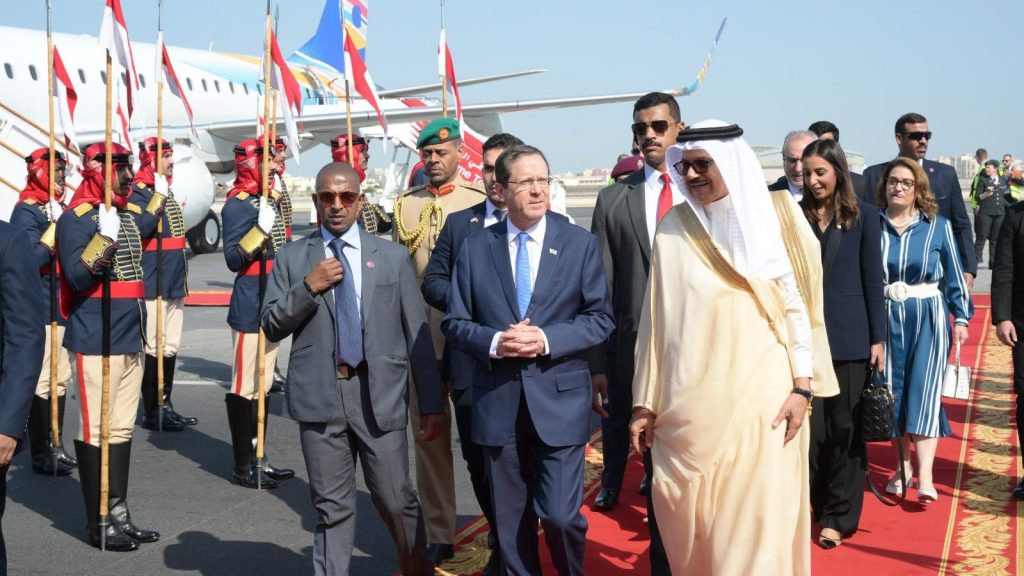Australia/Israel Review
The Abraham Accords and Israel’s new coalition
Dec 15, 2022 | David Weinberg

The many planned reforms of Israel’s incoming government in the security, defence, diplomatic and religious arenas – of which I am mostly supportive – are going to create difficulties for Israel’s foreign relations.
Much has already been written about the concerns in Washington and liberal Diaspora Jewish communities. It appears that Israel is under the microscope in Arab capitals too, specifically in the palaces of its new Abraham Accords partners.
In a recent series of meetings with think tank colleagues in the Gulf, I discovered deep disquiet about the emerging Israeli government coalition. To them, “tolerance” is the key concept behind the Abraham Accords, and they expect to see this reflected in Israeli government policy. Below, I will try to explain what they mean by “tolerance”.
My Emirati and Bahraini interlocutors are not opposed to any of the incoming government’s likely policies in principle. Nor in the longer term do they rule out the extension of Israeli sovereignty to parts of the West Bank (along the lines of, say, the Trump peace plan). After all, some of these moves are internal Israeli matters, and others, like Jewish prayer on the Temple Mount, stem from principles of tolerance and religious freedom that are treasured by the Gulf Arabs.
But the key, they say, is not to act like a bull in a china shop. If Israel starts building settlements in the West Bank with abandon – gets into what might be seen as trigger-happy live fire confrontations with Arab, Bedouin and Palestinian stone-throwers leading to a sharp rise in casualties – or barrels into the Temple Mount with wholesale changes in security and prayer protocols without attempting to conduct a respectful dialogue on this with the Arab world, then the Abraham Accords could suffer.
No Abraham Accords country is going to break relations with Israel or end intelligence and defence cooperation, especially against Iran. And many areas of cooperation – from environmental and agricultural cooperation to scientific, space and business partnerships – will continue apace. But Arab countries may feel it necessary to de-emphasise their ties with Israel in public and distance themselves loudly from the government in Jerusalem.
One Gulf colleague warned that the Saudis in particular stand at a tricky moment. Crown Prince Mohammed bin Salman could be ready to take significant new steps towards Israel. That is certainly the hope of incoming prime minister Binyamin Netanyahu, who has specified an Israeli breakthrough in ties to Saudi Arabia as one of his top priorities.
But I was warned that the Saudis could be forced into retreat if Israel acts “incautiously and intolerantly”. The first step away from Israel that the Saudis might take is a withdrawal of their permission for Israeli, Bahraini and Emirati airlines to fly over Saudi Arabia on routes to and from Israel. This would be a gigantic step backwards that would severely impact the development of Israel-Gulf ties, and of course, tourism. I consider this a stark warning.
This brings me back to the Abrahamic concept of “tolerance”. What the Gulf Arabs are trying to do is redefine the identity and global image of Arab Muslims based on a discourse of genuine tolerance and ideological moderation. They explicitly reject the discourse of hatred (of the West and of Israel) that lies at the root of extremist strains of Sunni and Shi’ite Islam.
Moreover, Gulf Arabs see Israel’s blend of tradition with enlightenment as a role model for their own societies. After all, Israeli society and the societies of the UAE, Bahrain and Morocco cherish their strong family, ethnic, cultural and religious identities while appreciating modernity. They uphold proud nationalist sentiment and a broad-minded approach to advanced education, international brotherhood and regional cooperation. And they all seek peace.
Consequently, the Arab leaders of Abraham Accords countries need to see Israel expressing tolerance, actively pursuing accommodation with Israeli Arabs and seeking peace with the Palestinians, too. They are not wedded to the archaic Oslo-era two-state paradigm, nor do they care about satisfying every extremist Palestinian demand. What they do care about is an approach of dialogue and tolerance.
They want to see Israel pursuing Jewish-Muslim channels of reconciliation, not angry altercations; opportunities for at least informal (“track two”) diplomacy with the Palestinians, not confrontation; and avenues for practical teamwork, not squabbles.
They expect that Israel will pursue dialogue with Israeli Arab leaders on matters of internal governance and with the broader Arab world on matters relating to sovereignty and especially Jerusalem.
How this squares with the current rejectionist policies, absolute hostility to Israel and even raw antisemitism of the Palestinian leadership, is unclear. How can Israel be expected to make progress with Mahmoud Abbas and his cronies, never mind with Hamas leaders? How can Israel forcefully roll back the mafia-style Bedouin protection rackets in the Negev, which it must, without some degree of confrontation? So I told my Gulf colleagues to temper their expectations.
Furthermore, I told them that Israel will firmly assert its sovereignty and governance in the face of Israeli Arab and Palestinian lawlessness. That is what most Israelis expect of their new government.
At the same time, I assured them that Israel will do so without racist incitement and delegitimising rhetoric, and without crude demonstrations of its power, but rather with finely calibrated tools and from an approach of maximum willingness to conduct dialogue. I trust that I am right.
David M. Weinberg is a senior fellow at The Kohelet Forum and Habithonistim: Israel’s Defence and Security Forum. © Israel Hayom (www.israelhayom.com), reprinted by permission, all rights reserved.
Tags: Abraham Accords, Israel






